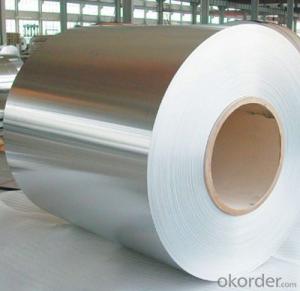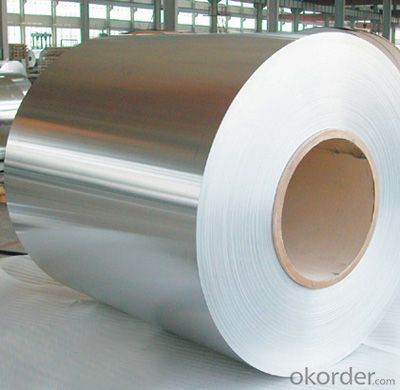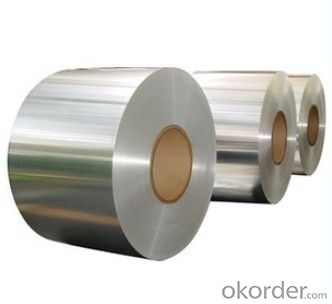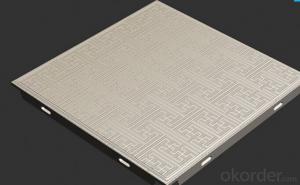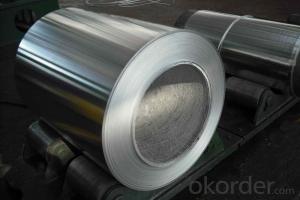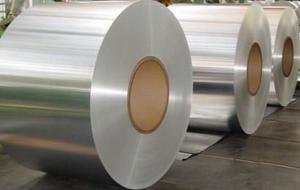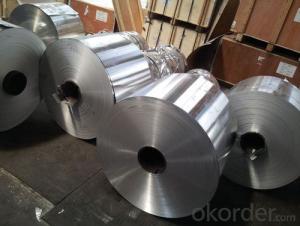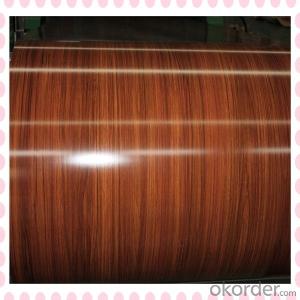Aluminum Sheet Metal Coil - EN AW 5050 Aluminium Coil for Refrigerator Panel
- Loading Port:
- Shanghai
- Payment Terms:
- TT OR LC
- Min Order Qty:
- 10 m.t.
- Supply Capability:
- 1000 m.t./month
OKorder Service Pledge
OKorder Financial Service
You Might Also Like
Specification
1. Structure of EN AW 5050 Aluminium in Coil Form for Refrigerator Panel Description
EN AW 5050 Aluminium in Coil Form for Refrigerator Panel is one semi-finished aluminium material. This coil can be rolled down to aluminium coil,sheet,circle ect. The alloy AA1050 is widly used in building, industry ect. Its weight is much lower than steel. So many customers choosed aluminium material instead of steel.
2. Specification of EN AW 5050 Aluminium in Coil Form for Refrigerator Panel
EN AW 5050 Aluminium in Coil Form for Refrigerator Panel | |
Main Specification | |
Alloy | AA1xxx (AA1050, AA1060, AA1070, AA1100 etc.) |
AA3xxx (AA3003, AA3004, AA3005, AA3105 etc.) | |
AA5xxx, AA6XXX (AA5052,AA5083, AA5754, AA6061, AA6062 etc.) | |
AA8xxx(AA8011, AA8006 etc.) | |
Temper | H14,H16, H18, H22, H24, H26, H32,O/F, T4, T6, T651 |
Thickmess | 0.01mm-100mm |
Width | 30mm-1700mm |
Standard | GB/T 3880-2006/ASTM |
Special specification is available on customer's requirement | |
3. Application of EN AW 5050 Aluminium in Coil Form for Refrigerator Panel
(1).Interior: wall cladding, ceilings, bathrooms, kitchens and balconies, shutters, doors...
(2).Exterior: wall cladding, facades, roofing, canopies, tunnels,column covers , renovations...
(3).Advertisement: display platforms, signboards, fascia, shop fronts...
4. Feature of EN AW 5050 Aluminium in Coil Form for Refrigerator Panel
Surfact Quality :
Be free from Oil Stain, Dent, Inclusion, Scratches, Stain, Oxide Dicoloration, Breaks, Corrosion, Roll Marks, Dirt Streaks and other defect which will interfere with use,
Mechenical Property:
Chemical Composite and Mechanical Property
5. Certificate of EN AW 5050 Aluminium in Coil Form for Refrigerator Panel
SGS and ROHS(if client request, paid by client), MTC(plant provided), Certificate of Origin(FORM A, FORM E, CO), Bureau Veritas and SGS (if client request, paid by client), CIQS certificate
6. Image of EN AW 5050 Aluminium in Coil Form for Refrigerator Panel
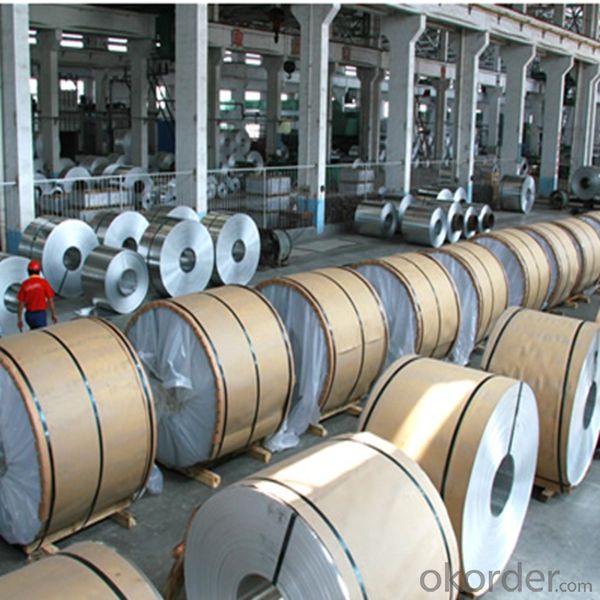
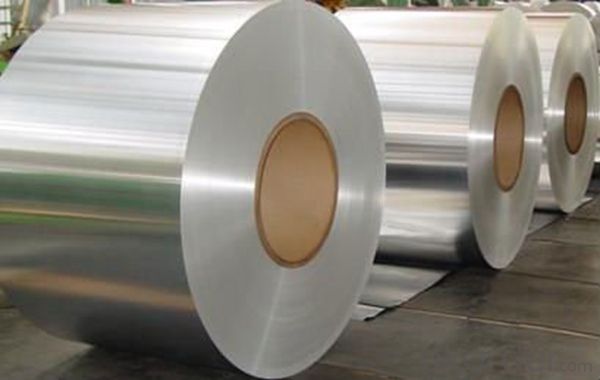
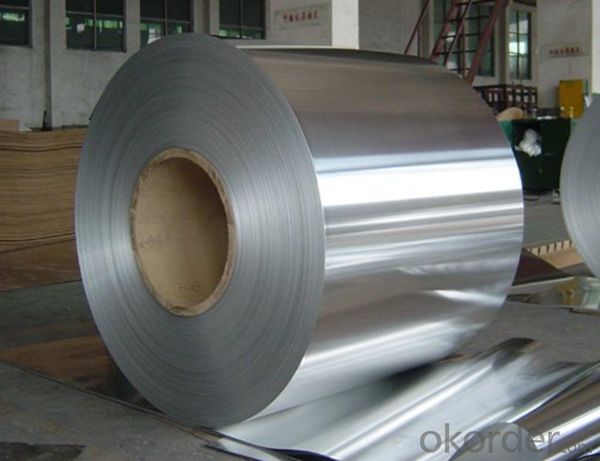
7. Package and shipping of EN AW 5050 Aluminium in Coil Form for Refrigerator Panel
First, plastic cloth with drying agent inside; Second, Pearl Wool ; Third, wooden cases with dry agent , fumigation wooden pallets, aluminum surface could cover blue PVC film
8. FAQ
1) What is the delivery time?
Depends on actual order, around 20 to 35 days
2) What is the QC system:
We have QC staff of 20 persons and advanced equipment, each production is with MTC traced from Aluminum ingot lot.
3) What market do you mainly sell to?
Australia, America, Asia, Middle East, Western Europe, Africa etc
- Q: The temperature of the water drops from 93.0°C to 78.0°C. What quantity of heat energy did the piece of aluminum absorb?
- The specific heat of Aluminum is 0.215 cal/g-°C. The calories absorbed (q) would be q = m * c * (T2 -T1) = 22.0 g * 0.215 cal/g-°C * (78.0 °C - 0.3 °C) If you have a different value for the Specific heat of Aluminum, use it in the formula for your calculations. If you knew the mass of the water, you could check your calculations because the heat gained by the Al would be equal to the heat lost by the water, using q = m * c * (T2 -T1), where m is the mass of the water, c = 1.00 calorie/gram °C, T2 = 78.0 °C and T1 = 93.0 °C. The sign of q will be negative.
- Q: What are the best rust-proof coils? Please tell me the model and manufacturer in Shangdong. Thank you.
- 3003 aluminum coil, AL-Mn series alloy, is the most widely used rust-proof aluminum with the density being 2.73. It is applicable to insulation projects such as pipe insulation, packaging, machine parts, refrigerator, air conditioning and ventilation pipes and other wet environment.
- Q: What are the potential applications of stucco-embossed aluminum coils?
- Stucco-embossed aluminum coils have a wide range of potential applications due to their unique properties and aesthetic appeal. Here are some potential applications of stucco-embossed aluminum coils: 1. Building and construction: Stucco-embossed aluminum coils are commonly used in the construction industry for cladding and roofing purposes. The textured surface of the stucco pattern enhances the durability and strength of the aluminum, making it suitable for exterior applications. It can be used on commercial and residential buildings to provide a visually appealing and long-lasting finish. 2. Insulation: Stucco-embossed aluminum coils can also be used for insulation purposes. The textured surface helps to increase the surface area, which improves the thermal conductivity of the material. This makes it an ideal choice for applications where heat transfer needs to be controlled, such as in HVAC systems or refrigeration units. 3. Appliances: Stucco-embossed aluminum coils are commonly used in the manufacturing of various appliances. The textured surface not only adds visual interest but also provides a durable and easy-to-clean finish. It can be used for the production of kitchen appliances like refrigerators, dishwashers, and ovens, as well as for other household appliances such as air conditioners or water heaters. 4. Transportation: Stucco-embossed aluminum coils find applications in the transportation industry as well. The textured surface provides improved traction, making it suitable for flooring and decking in vehicles like buses, trains, and ships. It is also used for decorative purposes in the interior and exterior parts of automobiles, giving them a stylish and modern look. 5. Packaging: Stucco-embossed aluminum coils can be utilized in the packaging industry as well. The textured surface adds strength and rigidity to the material, making it ideal for manufacturing containers, trays, and packaging materials that require durability and protection. It can be used for food and beverage packaging, pharmaceutical packaging, and various other applications where a strong and visually appealing packaging solution is needed. Overall, the potential applications of stucco-embossed aluminum coils are diverse and versatile. From construction to insulation, appliances to transportation, and packaging to various other industries, the unique properties and aesthetic appeal of stucco-embossed aluminum make it a popular choice for a wide range of applications.
- Q: Can aluminum coils be used in aerospace heat exchangers?
- Yes, aluminum coils can be used in aerospace heat exchangers. Aluminum is widely used in aerospace applications due to its lightweight and excellent heat transfer properties. It offers good corrosion resistance, high thermal conductivity, and is cost-effective, making it a suitable material for heat exchangers used in aircraft and other aerospace systems.
- Q: How are aluminum coils coated to enhance their durability?
- Aluminum coils are coated through a process called coil coating, where a thin layer of protective material is applied to enhance their durability. This coating can be done through various methods such as roll coating, spray coating, or coil coating lines. The coating material used is typically a combination of resins, polymers, and additives, which provide resistance against corrosion, UV rays, abrasion, and other environmental factors. This coating process helps to extend the lifespan of aluminum coils and maintain their appearance and performance even in harsh conditions.
- Q: Is it possible to utilize aluminum coils for crafting artistic installations or distinctive creations?
- <p>Yes, aluminum coils can be used to create art installations and other unique creations. Their malleability, durability, and lightweight nature make them ideal for sculptural works. Artists can bend, shape, and weld aluminum coils into various forms, offering a wide range of design possibilities. The material's reflective surface can also add visual interest, especially when used in installations that interact with light and shadow. Additionally, aluminum's resistance to corrosion makes it suitable for outdoor art pieces, ensuring longevity and low maintenance.</p>
- Q: What style of womens Oakley sunglasses come in aluminum? I need a tough pair and would like interchangeable lenses option also.
- Best Place for Oakley Sunglasses
- Q: How to remove the fingerprint and glue residue on the color aluminum coil?
- Try to use essential balm. We often use the essential balm to remove glue residue on the stainless steel bowl and basin.
- Q: Are aluminum coils suitable for signage systems?
- Indeed, signage systems find aluminum coils to be a fitting choice. The durability, versatility, and lightweight nature of aluminum render it a popular material option for signage. Its resistance to corrosion makes it apt for outdoor signage that endures diverse weather conditions. Aluminum coils possess the ease of being molded into different shapes and sizes, enabling flexibility in design. Moreover, aluminum can be painted or coated to attain various finishes and colors, thus granting high customizability and visual allure in signage applications. Ultimately, the utilization of aluminum coils in signage systems guarantees a durable, low-maintenance, and visually pleasing solution.
- Q: i dont want aluminum cookware, but how about a stainless steel set with an aluminum core. Is this the same as aluminum pots and pans? Thanks.
- The aluminum is encased in the stainless steel, usually as a thick disk in the bottom. It is an excellent conductor of heat and holds the heat well once it gets hot. All you see is the stainless, none of the aluminum because it's between two layers of stainless in the bottom of the pots. You are right, you don't want food cooked in straight aluminum, some metal taste can transfer to certain foods. That won't happen with stainless.
Send your message to us
Aluminum Sheet Metal Coil - EN AW 5050 Aluminium Coil for Refrigerator Panel
- Loading Port:
- Shanghai
- Payment Terms:
- TT OR LC
- Min Order Qty:
- 10 m.t.
- Supply Capability:
- 1000 m.t./month
OKorder Service Pledge
OKorder Financial Service
Similar products
Hot products
Hot Searches
Related keywords
